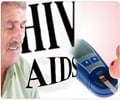A study led by NIH investigators has identified an antibody that compromises the immune systems of HIV-negative people, making them susceptible to nontuberculous mycobacteria.

NTM are close relatives of the bacterium that causes tuberculosis and can cause severe lung disease. NTM and other opportunistic infections are common in people with immune deficiency diseases, such as AIDS, but they are rare in people with healthy immune systems. However, researchers in Southeast Asia have recently reported several cases of NTM infections in people with no known problems with their immune systems.
The study, led by Sarah Browne, M.D., of the National Institute of Allergy and Infectious Diseases, and Peter Burbelo, Ph.D., of the National Institute of Dental and Craniofacial Research, enrolled 203 people, ages 18 to 78 years old. Of these participants, 52 had NTM infections, 45 had other opportunistic infections with or without NTM co-infection, 58 had tuberculosis, and 48 were healthy volunteers. All participants were HIV-negative.
The investigators examined participant blood samples for antibodies to cell-signaling molecules such as IFN-gamma. Eighty-eight percent of the people with NTM or other opportunistic infections had antibodies that blocked their own IFN-gamma (called autoantibodies).
The autoantibodies inhibited IFN-gamma function, hindering the immune system's ability to clear infection, causing a syndrome that made these study participants more vulnerable to opportunistic infections. More work is needed to determine why people in Southeast Asia appear to be predisposed to the development of this autoimmune condition. Because the average age of the study participants with NTM or other opportunistic infections was 50 years, the investigators speculate that these antibodies develop over time as a result of combined genetic and environmental factors. Having identified the likely cause of this syndrome, the study authors say it may be possible to treat the underlying problem by targeting the cells that make the IFN-gamma autoantibodies.
Source-Eurekalert








